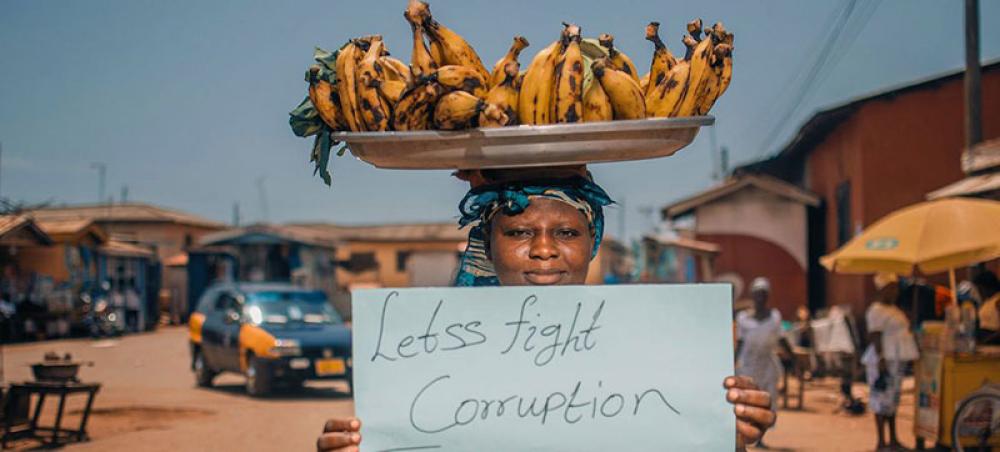Just Earth News | @justearthnews | 14 Dec 2021

Image: Unsplash/Nathaniel Tetteh
New York: Corruption spreads through societies and erodes people’s trust in leaders and institutions, UN Secretary-General António Guterres told an anti-corruption conference on Monday, stressing that “greed over need, harms us all”.
In a video message to the Conference of States Parties to the UN Convention against Corruption (CoSP9) in Sharm El-Sheikh, Egypt, he warned that countries investing in COVID-19 recovery, “must guard against the diversion of vital resources by criminal opportunists”.
‘Important step’
Corruption deepens inequalities, feeds cynicism and reinforces obstacles facing women and girls, according to the UN chief who maintained that tackling it is “an important step towards inclusive, sustainable development”.
He described the conference as an opportunity to strengthen cooperation and accelerate global action against corruption.
“Let us revive hope and restore trust in institutions…now is the time to act for a safer, more prosperous and just future”, spelled out the Secretary-General.
Speaking with ‘one voice’
The chief of the UN Office on Drugs and Crime (UNODC), Ghada Waly, said “we are here, at this crucial moment, to raise one voice in rejecting corruption”.
“Corruption undermines development, security, and the rights of everyone. It erodes public trust in systems and institutions”.
She added that the world loses trillions of dollars every year to corruption, “at a time when every dollar is needed to increase public investment”.
And Africa alone loses more than $88 billion annually in terms of capital flight.
“Lack of transparency and accountability in institutions denies people equal access to justice as well as to health, protection, and other services”, destroying competition, raising costs, and compromising delivery, said Ms. Waly.
Moreover, corruption enables criminals, traffickers, and terrorists by allowing proceeds of crime to find safe havens, channeling funds to terrorists, and providing gateways for trafficking.
The COVID-19 pandemic has underlined the impact of corruption on societies – aggravating vulnerabilities and threatening responses.
It has increased the importance of incorporating anti-corruption into responses and “should act as a global wake-up call…to take a stand for integrity”, she said.
“Here, in Sharm El-Sheikh, the world can rise to this moment and take action”.
Ladder of responsibility
Battling corruption starts at the highest levels of leadership and cascade down to institutions, businesses, communities, and individuals, the UNODC chief explained, saying “each and every one of us has a role to play”.
At the top, there is a need for “resolute political will” from leaders and government members, to mobilize the necessary resources.
“This forum, and its outcomes, can foster political will, and reaffirm the shared global responsibility to fight corruption”, she attested.
However, from law enforcement to financial investigation units and the judiciary, institutions at the forefront of the fight must be empowered, remain independent and be provided with the necessary resources.
“At this conference, we can better determine the needs of today in confronting corruption and commit global attention and resources to address those needs”, said Ms. Waly.
Other steps
Corruption is a cross-border crime that requires greater international cooperation by minimizing the obstacles that persistently hamper results.
“By joining the recently-launched GlobE network, which already includes 80 authorities from 48 countries, Member States can benefit from a global platform for swift law enforcement cooperation”, she said, urging the attendees to also engage with the World Bank and UNODC Stolen Asset Recovery (StAR) initiative.
She noted that businesses are instrumental in preventing corruption by committing to fair competition and protecting supply chains, while civil society is crucial in preserving accountability and the media in demonstrating integrity in their coverage.
“All of these actors are represented here at the CoSP, and we must include them in our responses”, flagged the UNODC chief.
Strengthening women
As agents of change, ordinary citizens are at the heart of responses and must be protected from corruption.
“Women are affected disproportionately by corruption and bribery”, the UNODC official stated.
“Long-standing networks of collusion reinforce exclusion in the workplace and in the public sphere, while corruption creates additional barriers to women accessing health, education, and other services”.
Women must be empowered in positions of leadership to break established cycles and structures of corruption, to ensure a fairer future for all.
Empowering youth
Although the world’s 1.8 billion young people hold the energy and conviction to foster change, in the absence of integrity, they are deprived of opportunity and hope.
“By educating children and young people on integrity and ethics, we can build public trust and the rule of law, helping to ensure the sustainability of anti-corruption efforts, and to generate new ideas for how we can fight corruption”, said Ms. Waly.
Against this backdrop, UNODC is launching the Global Resource for Anti-corruption Education and Youth Empowerment (GRACE) initiative to unlock the potential of young people.
“To truly overcome endemic corruption, we need to aim for a fundamental change in mindsets, one that rejects corruption at every level”, she said. “People must believe that every act of petty corruption, every small bribe, undermines the rule of law and undermines their own future”.
The UNODC chief concluded by encouraging everyone to use the convention to face today’s challenges and prepare for those to come.
“Let us live up to our role, for everyone’s rights”.